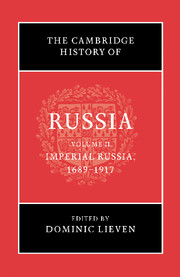Book contents
- Frontmatter
- Introduction
- Part I Empire
- Part II Culture, Ideas, Identities
- Part III Non-Russian Nationalities
- Part IV Russian Society, Law and Economy
- Part V Government
- Part VI Foreign Policy and the Armed Forces
- 23 Peter the Great and the Northern War
- 24 Russian foreign policy, 1725–1815
- 25 The imperial army
- 26 Russian foreign policy: 1815–1917
- 27 The navy in 1900: imperialism, technology and class war
- Part VII Reform, War and Revolution
- Bibliography
- Index
- Map 5. The Russian Empire (1913). From Archie Brown, Michael Kaser, and G. S. Smith (eds.) Cambridge Encyclopedia of Russia 1982.">
- Plate Section">
- References
25 - The imperial army
from Part VI - Foreign Policy and the Armed Forces
Published online by Cambridge University Press: 28 March 2008
- Frontmatter
- Introduction
- Part I Empire
- Part II Culture, Ideas, Identities
- Part III Non-Russian Nationalities
- Part IV Russian Society, Law and Economy
- Part V Government
- Part VI Foreign Policy and the Armed Forces
- 23 Peter the Great and the Northern War
- 24 Russian foreign policy, 1725–1815
- 25 The imperial army
- 26 Russian foreign policy: 1815–1917
- 27 The navy in 1900: imperialism, technology and class war
- Part VII Reform, War and Revolution
- Bibliography
- Index
- Map 5. The Russian Empire (1913). From Archie Brown, Michael Kaser, and G. S. Smith (eds.) Cambridge Encyclopedia of Russia 1982.">
- Plate Section">
- References
Summary
It is difficult to exaggerate the centrality of the army to the history of the Russian Empire. After all, it was due to the army that the empire came into existence in the first place. It was the army that conquered the territories of the empire, defended them, policed them and maintained internal security all at the same time. It was the army that transformed Russia into a great power, for it was the army that built the Russian state.
Yet if the army built the state, the state also built the army, and there was a symbiotic relationship between these two processes. By any reckoning the creation of a strong army was an extraordinary achievement, for in the middle of the seventeenth century Russia did not enjoy many advantages when it came to the generation of military power. To be sure, comprising over 15 million square kilometres in the 1680s, Muscovy was extensive in land area, but the population of the country, probably less than 7 million persons, was relatively small, and widely dispersed. Distances were vast, roads were execrable, the climate was insalubrious and much of the soil was of poor agricultural quality. Total state income amounted to a paltry 1.2 million roubles per annum and the country as a whole was undergoverned. Industry was underdeveloped, and Muscovy had to import both iron and firearms. Still worse, Russia lacked any natural, defensible frontiers and was hemmed in from the south, west and north by formidable enemies – the Ottoman Empire, the Khanate of the Crimea, the Polish-Lithuanian Commonwealth and the Kingdom of Sweden.
Keywords
- Type
- Chapter
- Information
- The Cambridge History of Russia , pp. 530 - 553Publisher: Cambridge University PressPrint publication year: 2006
References
- 12
- Cited by

